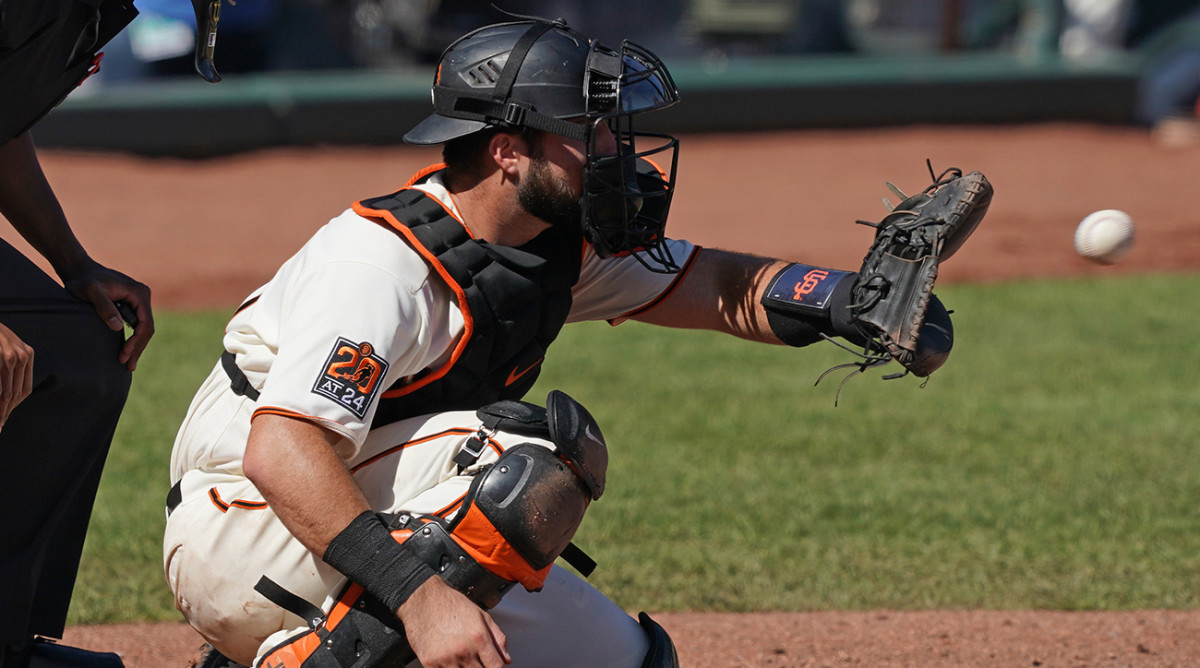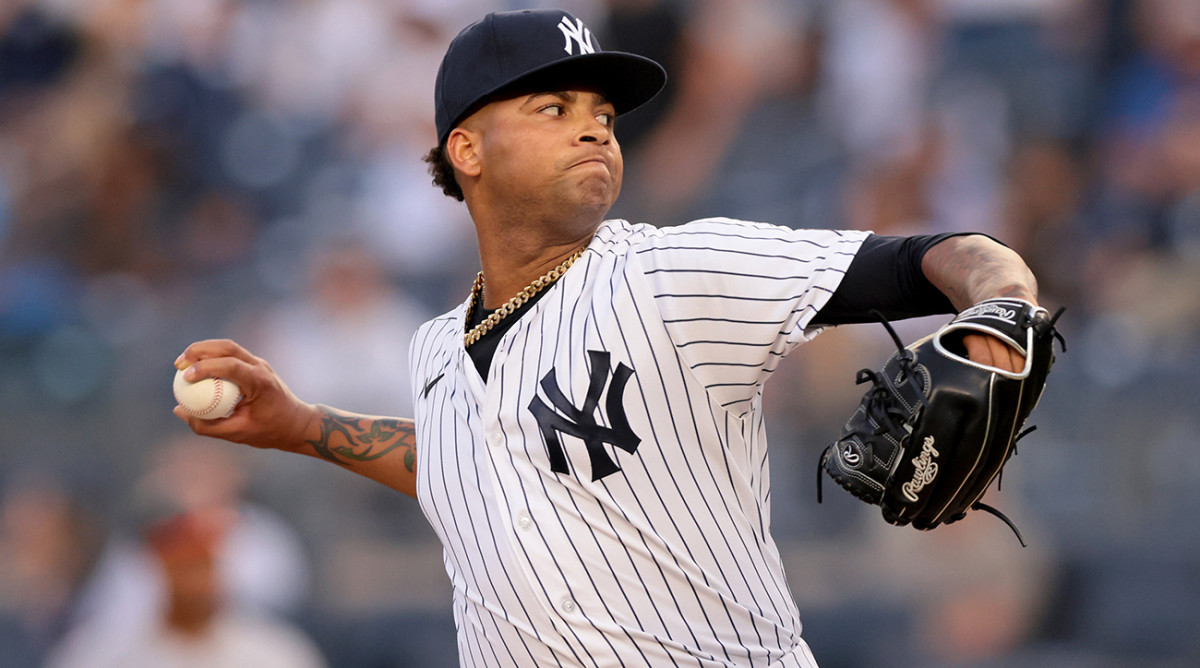Six Prospective September Call-Ups Who Could Swing MLB Playoff Races
Welcome to The Opener, where every weekday morning you’ll get a fresh, topical column to start your day from one of SI.com’s MLB writers.
In past Septembers, MLB teams could call up as many players as they pleased from their 40-man rosters, which served as an opportunity to drastically lengthen benches, bullpens and even the occasional rotation. This season, however, is the first under a new policy that allows for only two more players to be added to each team’s regular 26-man roster. There will accordingly be far fewer September call-ups than usual this year.
That’s a shame for several reasons—fewer feel-good stories about career minor leaguers getting their shot in the bigs, less rest for players in advance of the playoffs in an era with more pitcher injuries than ever—but that’s a debate for another time. Instead, let’s examine the cream of the crop—prospects who have a chance to be called up despite this restrictive rule and make an impact on the playoff race. And if their teams qualify for the postseason, maybe they could even swing a series in October.
The purpose of this isn’t to focus on veterans who were previously signed to minor league contracts and recalled this week, such as the Rays’ David Robertson, the Athletics’ Khris Davis or the Brewers’ Daniel Vogelbach. These are the players of the future who have a shot to break out this fall on their way to becoming household names. We’ll go in descending order of their ranking on MLB.com’s midseason update to its top 100 prospects.
(Stats are updated through Sept. 2.)

Joey Bart, Giants
MLB.com prospect ranking: No. 16, San Francisco’s No. 2
It feels like Joey Bart has been waiting to succeed Buster Posey behind the plate since the Giants won their last World Series. But in reality, he’s only been in San Francisco’s system since 2018, when he was drafted No. 2 out of Georgia Tech. Bart was given a prime chance to wrest the permanent starting role in ’20 when Posey opted out of the season. Even though the club’s veteran players vouched for him to make the Opening Day roster last summer, Bart largely failed to run with the opportunity, slashing .233/.288/.320 with 41 strikeouts in 111 plate appearances. And with Buster Posey’s resurgence in the final guaranteed year of his contract, the Giants opted to keep giving Bart regular at bats down at Triple A.
That’s a fair course of action, but Bart has responded by slashing .306/.368/.512 to show there’s not much more he can learn at Triple A. After missing most of August with a quad strain, the 24-year-old is raring for a recall once he settles back into game action.
Giants manager Gabe Kapler has rested Posey more than even most veteran catchers this season, giving a sizable amount of playing time behind the plate to Curt Casali. The 32-year-old backup has performed admirably in his role, but his offensive limitations (Casali is currently on an 0-for-16 skid) means San Francisco could benefit from seeing what it has in Bart. Since he’s a switch-hitter who’s expanded his defensive work to first base, Bart could be rotated into the Giants’ lineup for Posey or first baseman Brandon Belt to receive the regular playing time the front office wants him to gain.
Shane Baz, Rays
MLB.com prospect ranking: No. 20, Tampa Bay’s No. 1
The Chris Archer trade is the gift that keeps on giving for the Rays. Acquired alongside Tyler Glasnow and Austin Meadows in 2018, Baz is the latest success story for Tampa Bay’s player development system. The Rays cleaned up the righthander’s delivery and convinced him to scrap his two-seam fastball and decrease his curveball usage in favor of a blazing four-seamer and biting slider. With the graduation of Wander Franco to the majors this summer, the 22-year-old became Tampa Bay’s next heralded top prospect and has more than lived up to the billing ever since.
After carving up Double A to start the season with a 2.48 ERA and 49 strikeouts against just two walks in 32 2/3 innings, Baz has been arguably even more impressive in Triple A, recording a 1.80 ERA with 47 strikeouts and nine walks in 35 innings over eight starts. Baz has yet to build up the stamina of a regular starter, meaning he may be deployed much like the then 23-year-old David Price was as a reliever during Tampa Bay’s miracle run to the World Series in 2008.
But in a world where Michael Wacha (5.70 ERA) is still pitching every fifth day for the team primed to claim the American League’s top playoff seed, it’s possible we’ll see the Rays give Baz a shot to show what he can do as a starter.
José Barrero, Reds
MLB.com prospect ranking: No. 33, Cincinnati’s No. 3
The Reds haven’t had a true shortstop all season long, an Achilles’ heel that’s often hurt them starting from Opening Day. Kyle Farmer briefly appeared to plug the hole by raking to the tune of a 1.147 OPS in July. But the 31-year-old hasn’t topped a .630 OPS in any other full calendar month, has been playing through a sports hernia injury through most of the season and clearly isn’t the long-term answer.
Enter Barrero, who briefly held the starting job in 2020 after having never played above A ball. The 23-year-old Cuban, who changed his name from José García in May to honor his late mother, predictably struggled last year, hitting .194 with no home runs and two RBIs in 68 plate appearances. But the $5 million international signee has rebounded in the minors this season, slashing .303/.378/.536 in 83 games between Double A and Triple A.
Cincinnati is right on the edge of the postseason picture and could very well decide it doesn’t want to throw Barrero into the fire of a playoff chase. Indeed, he was granted a brief cameo last month before being sent down in favor of the newly claimed Asdrúbal Cabrera. But Cabrera is still searching for his first hit as a Red, going 0-for-7 with four strikeouts and a GIDP. Barrero is already a far superior defender than the team’s other middle infield options and could make a decisive impact down the stretch on that side of the ball alone.
Matthew Liberatore, Cardinals
MLB.com prospect ranking: No. 50, St. Louis’s No. 2
The Cardinals have sneaked back into the playoff race despite fielding a collection of starters that ranks 26th in strikeout rate (18.6%) and 18th in fWAR (2.6) since the All-Star break. The Redbirds’ rotation is crying out for reinforcements. In three starts since returning from a forearm injury, Miles Mikolas has had one good start against the Pirates and two bad ones (one also against the Pirates, and one against the Reds). J.A. Happ was blown up for seven runs on eight hits and two walks in a single inning of work against Cincinnati on Wednesday. That was Happ’s first poor start out of six with St. Louis, but his 6.77 ERA in 17 starts with the Twins this year is hard to forget. Jon Lester has produced near-identical ERAs above 5.00 for Washington and St. Louis this year. Cardinals GM John Mozeliak’s trade deadline strategy of stockpiling soft-tossing southpaw starters in their late 30s was an unorthodox one, to say the least.
Could Mozeliak reach into his farm system to pluck another lefty worthy of spelling one of the incumbents? Liberatore was selected by the Rays with the No. 16 pick in the 2018 draft and was then traded to St. Louis for eventual October 2020 breakout Randy Arozarena in January of last year. The 21-year-old Liberatore initially struggled this year as one of the youngest pitchers at the Triple A level, but has recorded a 3.09 ERA in his last five starts while pitching into the seventh inning in each of his last four.
Liberatore doesn’t boast the same sort of stuff as the other prospects listed here, but with three above-average pitches (fastball, 12–6 curveball and changeup) and plus command, he fits into St. Louis’s organizational mold and possesses a high floor that could help the Cardinals as they fight for their third straight playoff berth.

Luis Gil, Yankees
MLB.com prospect ranking: No. 99, New York’s No. 4
Luis Gil set the Bronx ablaze in August by delivering 15 2/3 shutout innings with 18 strikeouts alongside nine hits and seven walks allowed over three starts. He’s one of those athletic freaks who can unleash a fastball at 100 mph, a power-breaking ball in the upper 80s and a still-developing changeup that sits at 90. Despite that repertoire, he’s been kept in Triple A for the last few weeks as the Yankees’ pitching staff grew healthier.
The 23-year-old Dominican’s main roadblocks to a spot in New York’s rotation are a lack of control and opportunity. Gil has always had trouble accurately harnessing his impressive stuff, never maintaining a walk rate below 10% at any professional level and more frequently hovering around 15%. The return of Corey Kluber from the injured list has seemingly locked up New York’s five starting pitcher spots, but the team appears willing to make room for Gil soon.
The Yankees will play 20 games in as many days starting Friday, and manager Aaron Boone said he could “very easily see [Gil] making a start in one of those where we insert a sixth guy … or potentially coming out of the bullpen at some point during the month.” Gil was used as a reliever in his most recent minor league appearance to “see what it’s like to pitch out of the bullpen.” You can bet opposing hitters won’t look forward to seeing this guy come trotting out of there.
Kyle Muller, Braves
MLB.com prospect ranking: Not rated in top 100, Atlanta’s No. 5
Drew Smyly and Touki Toussaint were hit hard in outings this week, casting their places in Atlanta’s rotation into doubt. Manager Brian Snitker has already seemingly removed Smyly from his starting role, while Toussaint may get a bit of a longer leash after a throwing error snowballed into a bad inning at Coors Field on Thursday. But the 25-year-old righty has struggled for consistency in the past, and if he can’t set things straight, the Braves have a young fireballer waiting in the wings in Muller.
The 6' 7", 250-pound lefthander is a classic Texas prep product with a fastball that can touch triple digits. He already acquitted himself well in the majors earlier this year when called up due to a string of injuries to Atlanta’s rotation by recording a 3.79 ERA in eight starts. In his second start, he one-hit the high-octane Reds over five innings with nine strikeouts. He later allowed just one run to the Brewers over five innings with seven punches. The Braves sent him down last month after some old command issues resurfaced, and he’s improved on that front with six walks and two earned runs allowed over 18 innings of work.
If the Braves are to include the organization’s 28 best players on their roster this month, it’s hard to believe they wouldn’t call up Muller again at some point. The 2016 second-round pick has developed tremendously this season and has earned a ticket out of the minors. Atlanta may be reluctant to convert him into a reliever, even though he’d make a heck of an intimidating arm out of the bullpen with his fastball cranked up to max velocity in short spurts. The Braves may not have to worry about that if he continues to make a case for being one of the organization’s five best starters.
More MLB Coverage
• Assessing the NL MVP Race
• What to Watch for in the Regular Season's Final Month
• When the Mets’ Woes Are More Insidious Than Just the Jokes
